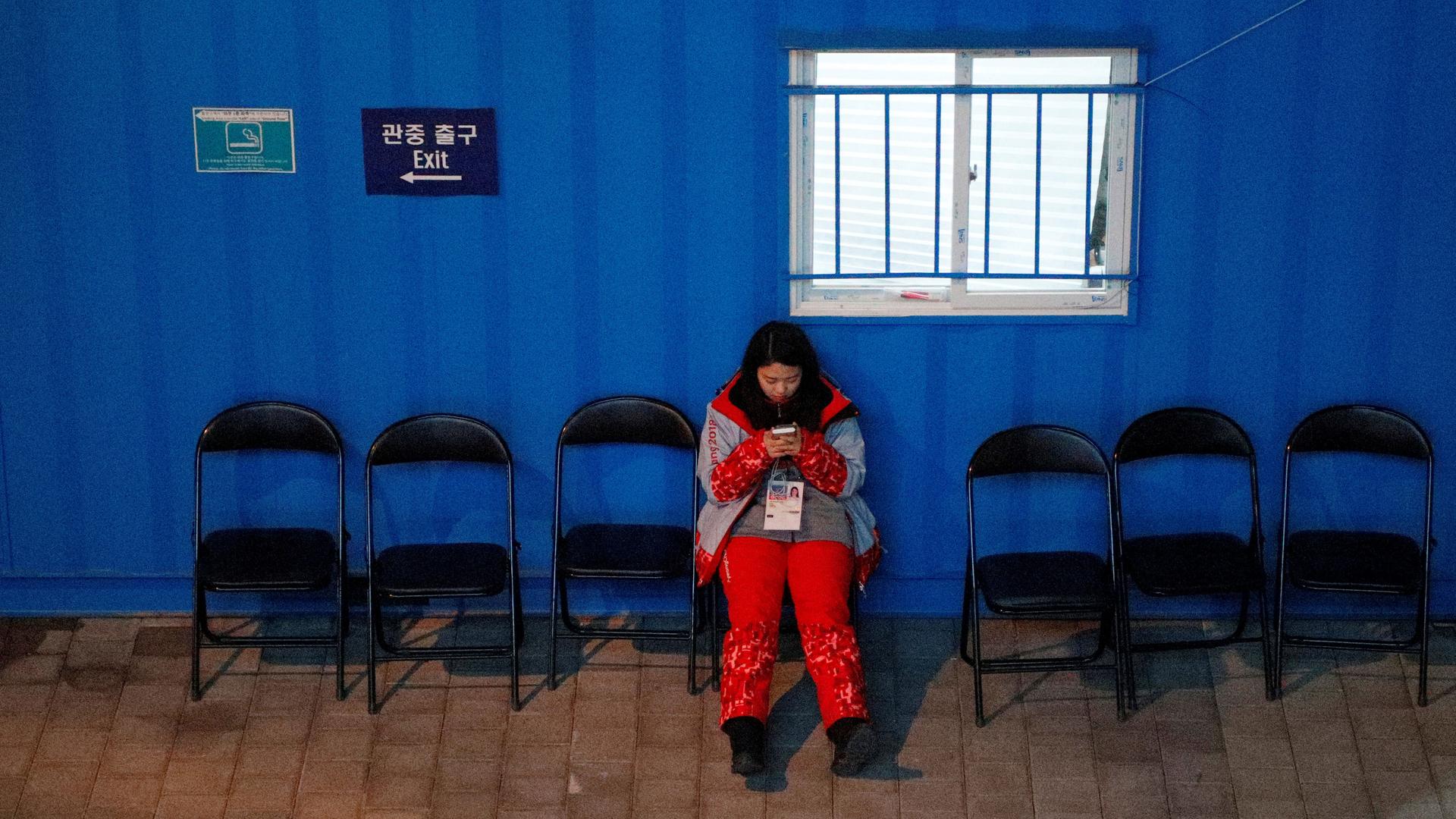5G wireless debuts at Olympics to nonplussed fans
A volunteer looks at her mobile phone at the PyeongChang 2018 Winter Olympic Park in Gangneung, South Korea, on Feb. 19, 2018.
The Pyeongchang Winter Games was supposed to be the coming-out party for 5G, the next generation of wireless technology — but few people noticed. And some of those who did were unimpressed.
"It was OK," South Korean spectator Lim Seol-hwa said, after visiting a truck outfitted with the technology, one of several demonstrations of 5G's applications at Games venues.
"It was quite real and interesting to try. It would have been better if we could have actually tried it with our own phone."
South Korea's largest telecom, KT Corp, had promoted Pyeongchang as the first "5G Olympic Games in the world", arousing interest from investors, other telecoms firms and networking companies curious to see if the technology is viable and how exactly it would be applied.
KT's marketing also led some Games spectators this month to believe their phones could use super-fast 5G — though that was never a possibility given 5G-compatible handsets have yet to be sold.
In KT's 5G demonstrations, company representatives show videos demonstrating the speed and capability of 5G, using real-time, 360-degree video of athletes competing. It's a feat that would be impossible on current 4G technology without buffering.
The 5G speeds reached in the trials were four times faster than 4G, according to chip maker Intel Corp, which partnered with KT. It allowed for crisp streaming of the Games' action from all angles with no buffering.
KT also staged a "5G Zone" at venues allowing passers-by to also analyze video in short time slices. About 100 cameras installed around the Olympic ice arena gave 360-degree views for people watching on special tablets, Games organizers said.
While the 5G Zone at the Gangneung ice hockey area was promoted on Pyeongchang's Olympics website, it was not available to attendees during hockey games and was based in an area reserved for Olympic families, making it hard to find.
American hockey fan Ben Dower was one spectator who had failed to spot the trial.
"I don't really know what 5G is," said Dower, who traveled from Washington to watch a game between the United States and neutral Russian athletes. "I've heard of the term but I just don't know how it's different from 4G."
KT spokeswoman Jiyoung Lee said KT had limited marketing rights at the Games and that this, in turn, had limited its ability to promote 5G as much as the company would have liked.
A spokeswoman for the Pyeongchang Games organizers said in a statement that "KT has exercised their marketing and promotion rights to the fullest through various efforts within Korea".
Makers of network equipment, device makers like Samsung Electronics and Apple Inc and chip designers such as Qualcomm Inc are counting on 5G to usher in a new wave of hardware upgrades — and income.
Network operators in South Korea, Japan and the United States are preparing to launch 5G this year or in 2019, with China also likely to be an early adopter. The European Union wants European companies to start offering 5G in 2020.
"Unfortunately, 5G is being over-hyped everywhere. Carriers are desperate not to appear as though they are falling behind," said Craig Moffett, a research analyst at MoffettNathanson.
"The reality is that true 5G is still a ways off."
KT spokeswoman Lee said it was "not right to say we're making any hype on the 5G service now".
KT, which wants to be among the first to roll out 5G, is also demonstrating at the Games how 5G can be used in future in smart cities, such as in autonomous vehicles.
One marketing expert, Rob Prazmark, chief executive of 21 Sports and Entertainment, who attended the Pyeongchang Games, said KT's efforts reminded him of how Philips used the 1992 Games in Albertville to introduce high-definition TV broadcasting, but it took many more years for HD TV to catch on.
However, Jang Jae-hyeon, an analyst at LG Economic Research Institute, said KT had made a decent start.
"It's still meaningful that KT really showed people what they have instead of a lab test," Jang said.
Sign up for our daily newsletter
